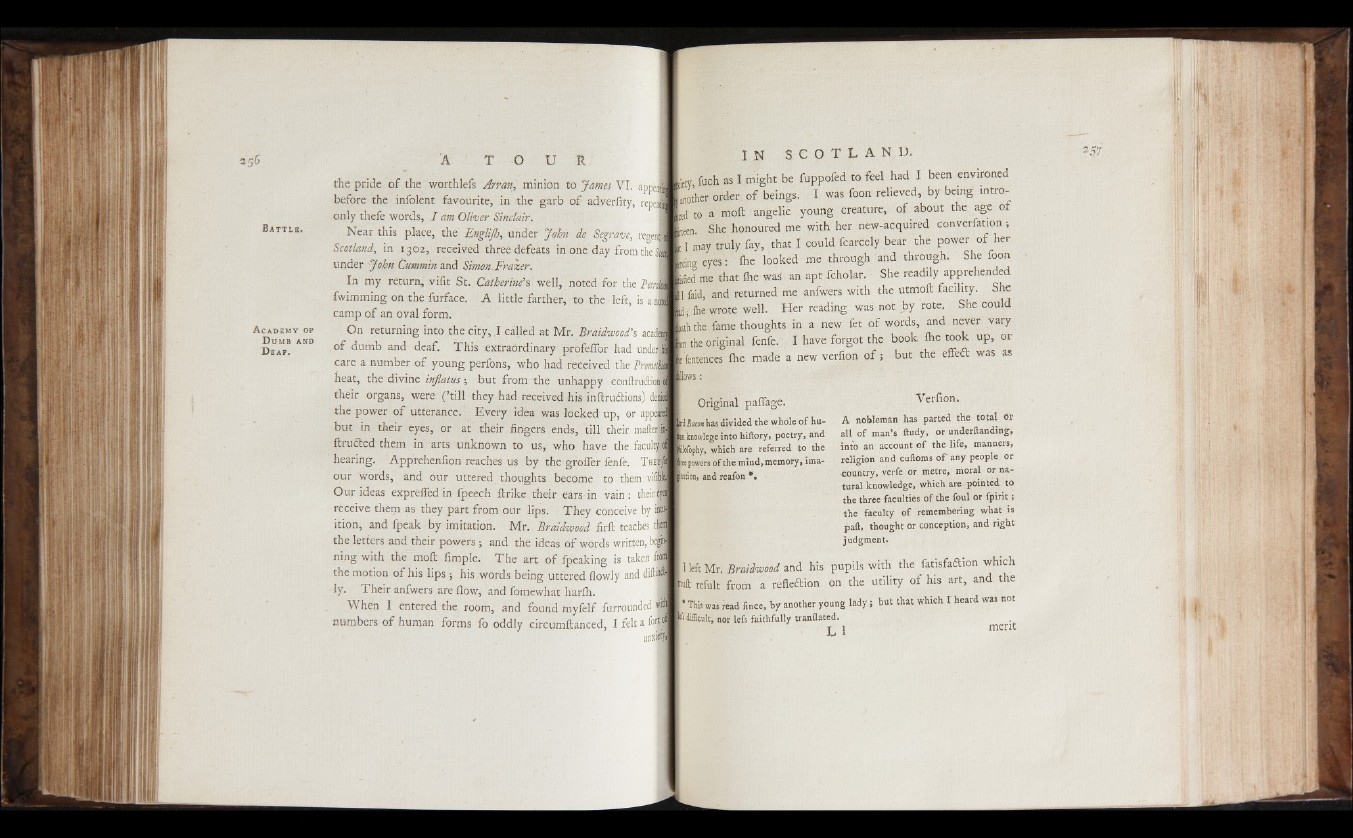
B a t t l e .
A c a d em y op
D u m b and
D e a f .
the pride of the worthlefs Arran, minion to James VI, appe,
before the infolent favourite, in the garb of adverfity, repeJ
only thefe words, I am Oliver Sinclair.
Near this place, the Englijh, under John de Segrave, regenl
Scotland, in 1302, received three defeats in one day from the jl
under John Cummin and Simon .Frazer.
In my return, vifit St. Catherine's, well, noted for the ° ,J
fwimming on the furface. A little farther, to the left, is an]
camp of an oval form.
On returning into the city, I called at Mr. Braidwood’s acadj
. of dumb and deaf. This .extraordinary profeffor had undeil
care a number .of young perfons, who had received the Promt!I
heat, the divine inflalus; but from the unhappy conftruftio*
their organs, were [’till they had received his inftrudtions) deli
the power of utterance. Every idea was locked up, or appeJ
but in their eyes, or at their fingers ends, till their mafteili
ftrudted them in arts unknown to us, who have the facultli
hearing. Apprehenfion reaches us by the grofier lenfe. Thew
our words, and our uttered thoughts become to them vilf
Our ideas exprelfedin fpeech ftrike their ears-in vain: theirf
receive them as they part from our lips. They conceive by i
ition, and fpeak by imitation. Mr. Braidwood firlt teaches t
the letters and their powers ; and the ideas of words written, bei
ning with the moft fimple. The art of fpeaking is taken f|
the motion of his lips ; his words being uttered flowly and di
ly. Their anfwers are flow, and fomewhat harfh.
When I entered the room, and found myfelf furrou nded «i
numbers of human forms fo oddly circumftanced, I felt *
anxied
Ltoyf.u c h as I might be fuppofed to feel had I been environed
[another order of beings. I was foon relieved, by being mtro-
pu to a moft angelic young creature, of about the age of
tteen. She honoured me with her new-acquired converfation
¡t I may truly fay, that I could fcarcely bear the power of her
L g eyes: ihe looked me through and through. She foon
ied me that ihe was an aptfcholar. She readily apprehended
,! laid, and returned me anfwers with the utmoft facility. She
¡d; ihe wrote well. Her reading was not by rote. She could
|ath the fame thoughts in a new fet of words, and never vary
m the original fenfe. I have forgot the book ihe took up, or
fentences ihe made a new verfion o f ; but the effeft was as
ilows:
Original paffage. Verfion.
HJ«a»has d i v i d e d the whole o f hu- A nobleman has parted the total Or
L'knowlege into hiftory, poetry, and all o f man’s ftudy, or undemanding,
lilo fo p h y , which are referred to the into an account o f the life , manners,
h e e p o w e r s of the mind,memory, ima- religion and cuftoms o f any people or
L i o n , and reafon • . country, verfe or metre, moral or natural
knowledge, which are pointed to
the three faculties o f the foul or fp ir it ;
the faculty o f remembering what is
paft, thought or conception, and right
judgment*
..left Mr. Braidwood and his pupils with the fatisfaftion which
pA refult from a refleition on the utility of his art, and the
* This was read fince, b y another young la d y ; but that which I heard was not
tfi difficult, nor lefs faithfully tranflated.
L 1 m e n t